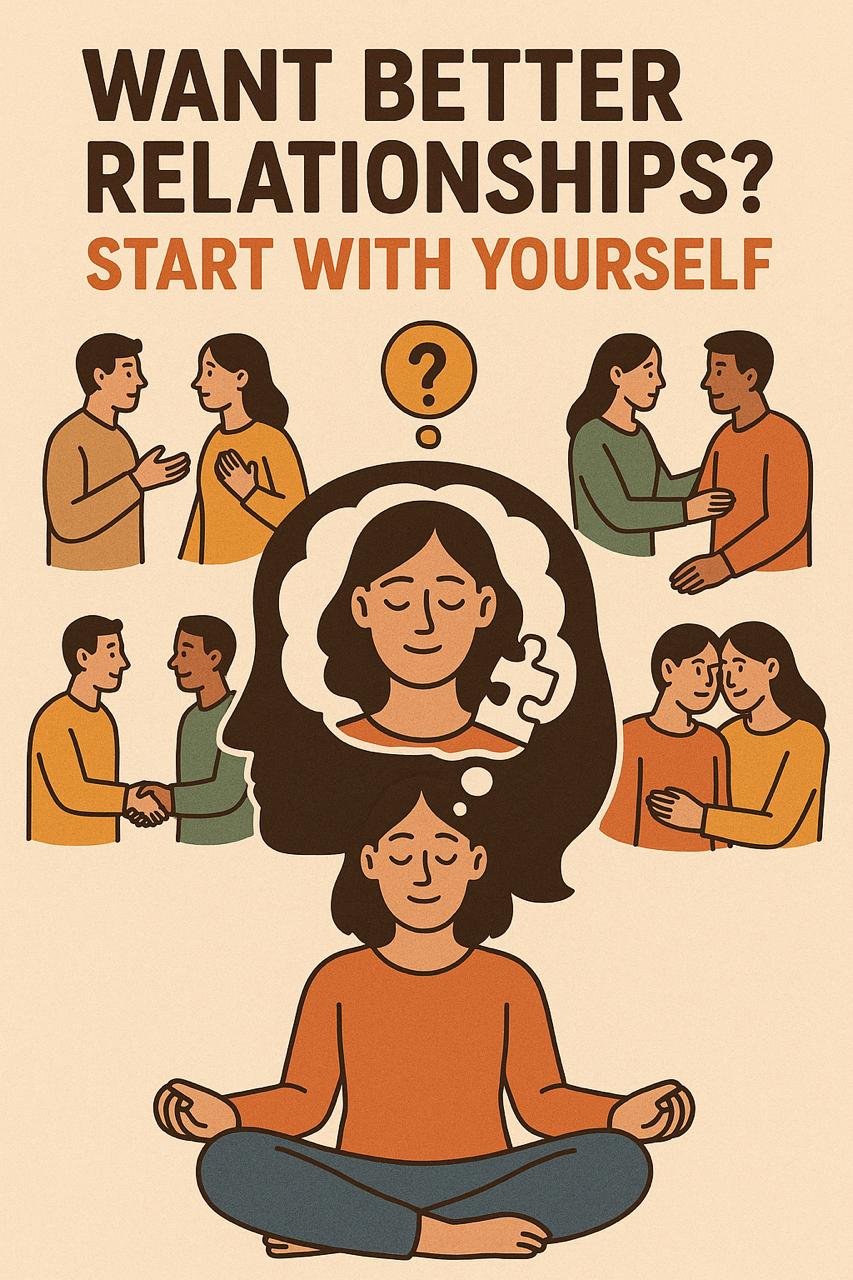Let’s be real — relationships can be both magical and messy.
Whether it’s your partner, your best friend, or your family, being close to another human being is one of life’s greatest joys and challenges.
But here’s something most people miss: the secret ingredient to strong, healthy relationships isn’t just communication or compromise — it’s self-awareness.
Understanding yourself — your emotions, triggers, and patterns — is the foundation of every meaningful connection. When you know what’s going on inside you, you can show up more honestly, communicate more clearly, and love more consciously.
Let’s talk about why it matters so much, and how you can start building it today.
What Does “Self-Awareness” Really Mean
At its simplest, self-awareness is the ability to recognize your thoughts, emotions, and behaviors — and understand how they affect you and the people around you.
It’s the difference between saying:
- “You make me so angry when you ignore me!”
and saying:
- “I feel rejected when I don’t get a response — it triggers my fear of being ignored.”
That shift from blame to ownership changes everything.
Psychologist Daniel Goleman, the expert on emotional intelligence, calls self-awareness the foundation of all emotional growth. Without it, we’re basically reacting on autopilot — driven by emotions we don’t fully understand.
💬 Why Self-Awareness Matters in Every Relationship
1. You Communicate More Clearly
When you know what you feel and why, you can express it instead of exploding.
Miscommunication is usually not about what you say but how you say it.
- Without self-awareness: “You’re so cold lately.”
- With self-awareness: “I miss the affection we used to share. Have you been feeling distant too?”
The second opens a door; the first builds a wall.
2. You Respond Instead of React
We all have emotional “triggers” — rejection, control, fear of abandonment, or feeling unheard.
When you’re aware of yours, you can pause instead of pouncing.
That pause — even three seconds — can save a relationship from unnecessary damage.
Try saying:
- “I’m feeling triggered right now. Can we take a break and talk in a few minutes?”
That’s emotional regulation in action — not weakness, but strength.
3. You Build More Empathy
Once you understand your own emotions deeply, you naturally become more sensitive to others’.
You stop judging and start understanding.
It’s not about agreeing — it’s about saying, “I can see where you’re coming from.”
And that’s the foundation of emotional intimacy.
4. You Choose Healthier Relationships
Self-awareness helps you break old patterns.
You stop dating the same type of emotionally unavailable person.
You stop trying to “fix” people who don’t want to be fixed.
You recognize what’s healthy and what’s not — because you finally understand yourself.
That’s not ego. It’s evolution.
🧩 The Psychology Behind Self-Awareness
There are two key types of self-awareness, according to psychologists:
- Internal self-awareness — understanding your emotions, motives, and values.
- External self-awareness — understanding how others perceive you.
Some people are strong in one and weak in the other.
Maybe you’re super introspective (you journal, reflect, analyze) but totally unaware that you come across as distant.
Or maybe you care deeply about others’ opinions but rarely check in with your own feelings.
The real magic happens when you have both: when you know yourself and understand your impact on others.
💡 5 Practical Ways to Build Self-Awareness in Relationships
Enough theory — here’s how you actually do it.
1. Pause Before You React
When something triggers you, stop and ask:
- “What am I really feeling?”
- “When else have I felt this same emotion?”
- “Is this about now, or something from my past?”
That tiny moment of reflection can completely change how you respond.
2. Journal or Voice Note Your Feelings
You don’t need a fancy journal. Just jot down what you felt after a conversation or argument.
Over time, you’ll notice patterns like:
- “I feel insecure when plans change suddenly.”
- “I shut down when I think I’m being criticized.”
Awareness turns emotional chaos into clarity.
3. Ask for Honest Feedback
Yes, it’s uncomfortable — but it’s gold.
Ask trusted people:
- “How do I come across when I’m upset?”
- “Do you ever feel like I don’t listen?”
You’ll learn things about yourself that you can’t see from the inside.
4. Own Your Emotional Triggers
Everyone has them. Instead of blaming others for pressing them, own them.
Maybe your partner isn’t “making” you feel insecure — maybe they’re just reminding you of an old wound.
Owning your triggers doesn’t excuse someone else’s behavior, but it empowers you to heal from within.
5. Practice Mindful Listening
When someone speaks, don’t plan your reply.
Just listen — not to defend, but to understand.
Pay attention to the emotions underneath their words.
That’s how you build trust and emotional safety — the real glue of lasting relationships.
🌱 The Ripple Effect of Self-Awareness
When even one person in a relationship becomes more self-aware, everything changes.
Arguments soften. Conversations deepen. Love becomes less about ego and more about connection.
You start seeing your partner (or friend, or parent) not as someone to change — but as someone to understand.
And funny enough, when you change how you show up, they often change too.
Your calm becomes contagious.
Your honesty gives others permission to be honest too.
That’s how relationships evolve — not through perfection, but through presence.
Ready to put your self-awareness into action?
Start with 4 Simple Exercises to Strengthen Your Relationships— small, intentional practices that can make your connection even stronger.
Final Thoughts
Self-awareness isn’t a one-time revelation. It’s an ongoing practice — a lifelong conversation between who you are and who you’re becoming.
It’s not about self-criticism; it’s about self-honesty.
It’s not about fixing yourself; it’s about understanding yourself so you can show up authentically.
So the next time you feel misunderstood, frustrated, or disconnected, pause.
Take a breath. Ask yourself:
“What’s really happening inside me right now?”
That single question — simple, honest, human — can transform not just your relationship, but your entire emotional world.
Because healthy relationships don’t start with finding the perfect person.
They start with becoming self-aware enough to love — and be loved — consciously. 🌿
Subscribe and Never Miss a Motivational Boost !!

